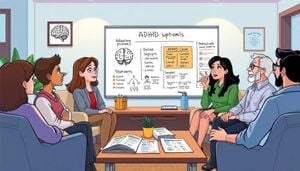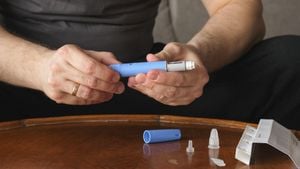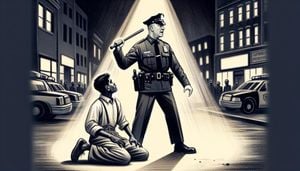Millions of lives hang in the balance as the NHS launches its renewed stroke awareness campaign, aiming to ignite public recognition of the alarming reality surrounding stroke symptoms and the urgent need to seek help. This comprehensive outreach is more than just a public service announcement—it's about saving lives.
The rollout follows troubling new data indicating the average time it takes for individuals experiencing stroke symptoms to call for emergency assistance is 88 minutes. Alarmingly, this almost 90-minute delay could turn potentially treatable strokes, which are emergencies requiring immediate action, instead, they become significant health complications, impacting both life and quality of life.
Analysis by the Sentinel Stroke National Audit Programme at King’s College London reveals definitive statistics for the year 2023-24. The data tracked 41,327 patients who noted the onset of their symptoms, highlighting the stark response time to emergency services. The campaign's launch coincides with fresh polls showing public misconceptions about stroke triggers, with 57% of respondents mistakenly believing multiple symptoms (two to three) must be present before dialling 999, as if waiting could somehow negate the emergency nature of these conditions.
England's Chief Medical Officer has been vocal about the campaign’s importance, emphasizing the urgency to contact emergency services even if the symptoms appear slight or unalarming. Dr. Stephen Powis, one of the leaders behind the campaign, insists every minute counts, stating, "These figures highlight clearly the need for greater public awareness of stroke symptoms and the necessity to act quickly. Any sign of stroke, no matter how trivial it may seem, is always serious. Immediate intervention is what can save lives."
What are the symptoms to look out for? The revamped campaign underlines two key visuals: the ‘ACT FAST’ acronym—a simple and mnemonic device service for recognizing strokes. The signs include difficulty smiling (Face), inability to raise both arms (Arms), and slurred speech (Speech). These signs are often overlooked or misinterpreted which can lead to significant delays. Alarmingly, nearly two-thirds of individuals surveyed indicated they would not call 999 when observing someone struggling to smile.
But why call 999? The data speaks for itself: with strokes causing around 100,000 incidents yearly, leading to 38,000 deaths, immediate recognition and action are pivotal. Without prompt medical attention, strokes can cause severe harm, including permanent disabilities such as paralysis, communication issues, and memory loss. Even more unsettling is the fact strokes affect people of all ages, though those over 50 or from certain ethnic backgrounds are at higher risk.
One of the campaign's personal elements involves stories from survivors, highlighting their journeys—a poignant reminder of who the campaign seeks to assist. Dionne Hudson, 58, felt a numbness take over her body without linking it to the possibility of having had a stroke. Her narrative is agonizing; it underlines how close she came to missing the early signs entirely. "I thought I was being dramatic since my face and speech were unaffected, so I attempted to sleep it off,” she recounted. Thankfully, her eventual call for help was almost too late, leading to her partial paralysis on one side.
Following her stroke, Dionne's recovery has been promising, highlighting the fine line between life-saving and life-altering outcomes. "The doctors were astounded I survived, but they cautioned me about the time it took for me to seek help. I was lucky and would urge everyone to be vigilant because the first few moments can significantly affect recovery outcomes,” she noted.
This urgent outreach campaign also includes poignant testimonials from notable public figures, such as Chef Brian Turner, who shared how swift action from his agent saved him from dire consequences, and Dr. Amir Khan, who emphasizes the catastrophic potential of waiting. "A stroke strikes every five minutes; we need to make this urgent knowledge accessible to everyone," he declared.
The NHS has also ramped up resources and training for professionals on the front lines, ensuring immediate assessments and rapid treatment pathways. For the public, the message is clear: being aware and recognizing symptoms saves lives.
Furthering the reach of the campaign, the NHS is employing media strategies including TV and radio ads to educate the public about strokes, illustrating symptoms and stressing the importance of quick action. The campaign even features powerful visuals of stroke survivors reacting to audio of the calls they made for help—stories of hope coupled with the stark realities of delay.
The spotlight on stroke awareness cannot be emphasized enough, with calls for societal shifts where recognition, awareness, and responsibility lead to quicker responses and lives saved. Juliet Bouverie OBE, the CEO of the Stroke Association, reinforced this notion: "Every minute matters. It’s not just elderly people who suffer strokes—anyone can be affected. Knowing you must call for help if you witness stroke symptoms might be the difference between life or long-term disability for someone you love."
The urgency of the NHS campaign is grounded in the stark reality of stroke incidence across the UK. Each year, thousands experience strokes, yet many misunderstand the dire need associated with the initial symptoms. Rapid awareness and immediate action could be the thread between life and continued health.
This campaign not only raises awareness about the signs and symptoms but also fosters community solidarity, urging people to look out for one another. Maintaining proactive public health education ensures people stay informed to act when necessary. The road to recovery is often paved with the 'what ifs'—the goal is to garner support and recognition before they emerge.
With strokes on the rise, driven by factors including the aging population and lifestyle choices impacting health, the importance of rapid response becomes ever more evident. Investing time to understand these signs can change lives. The ‘Act FAST’ motto embodies the essence of this campaign—a lifeline reaching out to the community, encouraging swift recognition and action. Awareness is just the beginning; action is the catalyst. By transforming knowledge from these campaigns, communities have the potential to save lives. The NHS urges the public to stand vigilant, recognizing signs of strokes, to dismantle misconceptions and promote timely medical interventions, fostering stronger health outcomes across the population.
Immediate action, informed communities, and persistent outreach can shape the future of stroke treatment and survival rates, ensuring fewer families face the long-term impacts of such serious health events. It's time society shifts to protect lives actively—with awareness as the first step and immediate action as the follow-through.



